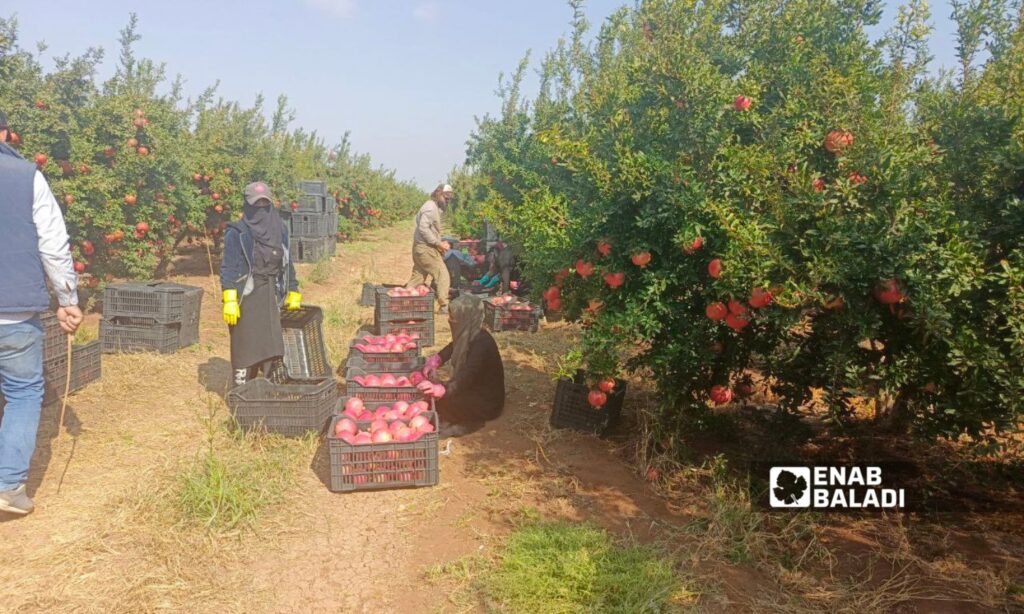Daraa – Halim Muhammad
Farmers in Daraa governorate (southern Syria) have begun harvesting their crops of pomegranates and olives since the beginning of this October, amid production estimates described as “good and promising,” although drought and weather conditions have caused pomegranates to crack in some fields.
The pomegranate and olive seasons provide job opportunities for many, as demand for labor increases during the harvest period.
According to farmers and daily wage workers interviewed by Enab Baladi, wages for workers in Daraa increased at the start of the season from 30,000 Syrian pounds (two US dollars) to 40,000 for every five hours of work.
High olive production
The olive crop in Daraa is divided between table olives, which began harvesting in early October, and olive oil olives, which will be harvested by early November.
Yusuf (30), a farmer from the western rural area of Daraa, with ten dunams of olives and eight dunams of pomegranates, said that the productivity of both crops is “good” compared to last season.
Yusuf sold some of the table olive crop (from trees prepared to bear fruit), and is still waiting to harvest the remaining crop until the time for olive oil extraction.
The price of a kilogram of table olives of the “Abu Shouka” variety reached 12,000 Syrian pounds (81 cents), while the price varies by type, with the “Istnbuli” variety, suitable for both table use and oil extraction, being sold for 10,000 Syrian pounds (68 cents).
Olive production has gradually improved, with the Daraa Agriculture Directorate expecting a production of 28,673 tons of olives for this season, compared to 25,000 tons last season and 19,500 tons the previous year.
The number of olive trees in Daraa governorate currently stands at around 3.5 million trees.
Cracked pomegranates
Farmer Yusuf stated that nearly three tons out of his crop, estimated at 35 tons, have cracked due to the nighttime temperature drop and daytime rise.
This year’s weather conditions increased the cracking percentage compared to previous years, as the cracked quantity from Yusuf’s crop did not exceed 300 kilograms last year (2023).
Farmer Ahmad (40) reported that the cracking percentage of pomegranates on his land was even higher, as he owns ten dunams in the village of Zeyzoun in the western rural Daraa, and was unable to water his crop regularly, noting that the cracking rate equals half of his total production.
He added that this cracking could lead to financial losses this season, attributing the cracking to the low water level in his well, which caused delays in irrigating his crop.
Agricultural engineer Khaled Suleiman told Enab Baladi that cracked pomegranates are a problem with multiple causes, including the fluctuation of temperatures between day and night, irregular watering schedules, and nutrient deficiencies in the soil, specifically calcium and potassium.
To reduce the impacts of pomegranate cracking, the engineer suggested using potassium nitrate at the beginning of the season, as well as spraying the crop with calcium or adding it as fertilizer to the soil, which helps strengthen the fruit’s skin.
He mentioned that pomegranates require saturated irrigation every 15 days, explaining that cracking may increase if watering is delayed and followed by large amounts of water.
Cooling takes over the crop
Some farmers in Daraa sell their produce directly to traders, known as “guaranteed sales,” with some traders relying on storing pomegranates in cooling units and selling them in the market or exporting them during the winter.
Traders commonly store the French variety, which is prevalent among most pomegranate farmers in Daraa.
Stored pomegranates are handled delicately, ensuring careful harvesting and placing them in plastic boxes insulated with paper. Traders select ripe fruits that haven’t cracked and must maintain a specific cool temperature.
Cooling units have spread throughout Daraa, with their owners renting them to traders for 600 Syrian pounds per kilogram stored.
The price of cracked pomegranates is set at 500 Syrian pounds per kilogram, which is less than the costs of harvesting, transporting to market, packaging, and labor, according to farmer Ahmad.
The Daraa Agriculture Directorate estimated the governorate’s pomegranate production for this season at 26,574 tons, compared to 21,500 tons in the previous season.
Bassam al-Hashish, Director of Agriculture in Daraa, told the government Al-Thawra newspaper that pomegranate prices range between 4,000 and 6,000 Syrian pounds (40 cents), emphasizing the importance of pomegranate trees in the governorate, following olive and grape trees. Pomegranates are irrigated crops requiring special care.
According to statistics from the Daraa Agriculture Directorate for 2023, the area planted with pomegranates reached 1,021 hectares, with approximately 600,000 pomegranate trees.

